Tacitus
Tacitus (c.55-c.120): Roman historian, author of a/o the Histories and the Annals.
Early Career
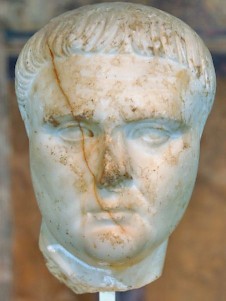
Tacitus was born in c.55, perhaps in southern Gaul. His father was a wealthy man and belonged to the second tier of the Roman elite, the knights, or - to use a more stately expression - the equestrian order. The young man was sent to Rome to study what is called rhetorics, which is not just the art of speaking in public, but in fact a grand cultural education that included everything a magistrate needed to know.
The last years of the reign of Nero must have impressed the student. There were several conspiracies to remove the eccentric, increasingly tyrannical emperor; Rome itself was still suffering from the big fire that had destroyed the city in 64; and in the end, the civil war known as the Year of the Four Emperors (69) broke out, culminating in the accession of Vespasian. These events may explain Tacitus' gloomy world view: he knew what it meant when government collapsed.
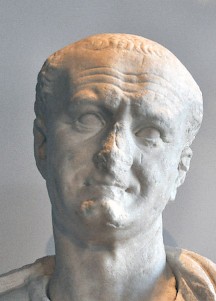
He owed much to the new dynasty, as he admits in the prologue of his Histories:
My official career, owed its beginning to Vespasian, its progress to [his eldest son] Titus, and its further advancement to [Vespasian's second son] Domitian.
Tacitus was quaestor in 81 or 82, and after this, he was admitted to the Senate. This ancient body had lost much of its power, but its members continued old traditions about what it meant to be Roman: the empire ought to expand, barbarians had to be conquered, civilization had to be propagated. These ideas, however, had become unfashionable at court. Military men like the emperors Tiberius and Vespasian knew that not every conquest was rewarding, and understood that only living soldiers deterred enemies. Tacitus, however, internalized the senatorial ethic as only a newcomer can.
During the reign of Domitian, he served as praetor, and between 89 and 93, he must have commanded a legion or governed a province. He may have been glad to be away from Rome, because the emperor and the Senate were on bad terms. "We witnessed the extreme of servitude," Tacitus wrote in his Agricola,note but that did not prevent the new senator from reaping the benefits of imperial patronage. His wife accompanied him when he was out of town, a rare privilege for a commander or governor, and he was appointed consul for 97.
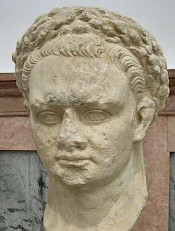
By then, Domitian had been assassinated, the old senator Nerva had been made emperor, and he had been forced to appoint general Trajan as his successor. Well-known supporters of the former regime like Tacitus and his friend Pliny the Younger were able to continue their career, but must have felt embarrassed. This feeling is the background to his Agricola, which was published in 98.
Literary Debut
Gnaeus Julius Agricola had been the father of Tacitus' wife - her name is not recorded - and was one of Rome's most distinguished generals during the reign of Domitian. The old war horse had been decorated for several successful campaigns in Britain. By writing a biography of his father-in-law, Tacitus had an opportunity to make a couple of things clear about what it meant to serve a tyrannical emperor. A wealthy man had duties towards society that he could not honorably evade. Agricola had accepted this responsibility, but it had not been easy, for example when Domitian, jealous of Agricola's success, had decided not to prolong his governorship. Worse, the emperor had -according to Tacitus- let slip an opportunity to add Caledonia and Hibernia (Scotland and Ireland) to the empire.
We may read between the lines of the Agricola that criticism of other magistrates, like Tacitus himself, was base and honorless. In other words, the Agricola is a veiled apology. Nor is it critical of Roman imperialism, as is sometimes assumed: on the contrary, the successful commander was a cornerstone of the senatorial ethic, and Agricola is presented as a hero, unlike the emperor who terminated Agricola's command.
Publications
Tacitus employed a similar literary strategy in his next work, the Germania. Again, the main object is to distance himself from Domitian; again, the text is not what it seems to be. At first sight, it is an anthropological treatise about the customs of the inhabitants of 'free' Germania, who are presented as barbarians - sometimes noble savages - enjoying a liberty that verges on chaos. Any senator knew that for their own benefit, those savages ought to be conquered. In fact, Domitian had successfully conducted a war against the tribe of the Chattians and issued coins with the legend Germania capta ("Germania conquered"), but by stressing that the tribesmen were still living a life of liberty, Tacitus argued that the emperor had been a liar.
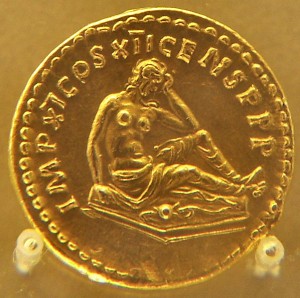
We do not know if Tacitus was able to clear his reputation. The fact that there is a sixteen-year gap in our knowledge of his career (97-113) suggests that Trajan continued to have some doubts. In c.105, Tacitus published a treatise on eloquence, the Dialogue on the Orators. The art of speaking in public had, in his view, had flourished during the years of the free republic but had suffered from the fact that senators were no longer involved in actual policy-making.
Between 105 and 109, the Histories were published, a splendid account of the Year of the Four Emperors, the Batavian Revolt, and the beginning of the reign of Vespasian. The story breaks off during the negiotiations between the Batavian rebel leader Julius Civilis and the Roman general Cerialis; the greater part of Vespasian's rule and the reigns of his sons are missing. Tacitus is critical of almost every actor - the senators are cowards, the soldiers are greedy, the emperors are weak.
We also meet the theme now familiar: how to act nobly in an age of tyranny? For example, the three main actors in the story of the Batavian Revolt are the Batavian leader Julius Civilis, a noble savage; the decadent Roman general Hordeonius Flaccus, symbol of despotism; and the commander of the Twenty-second legion Primigenia, Gaius Dillius Vocula, who sets an example of old-fashioned senatorial virtue. All three men are essentially stereotypes - not convincing characters. Still, it is a good story.
In 113, Tacitus was governor of Asia (which he had once called "a rich province, easy to extort",note and after his return, he published his Annals, in which he told about the reigns of Tiberius, Caligula, Claudius, and Nero. The famous description of Nero's persecution of the first Christians is part of this book.
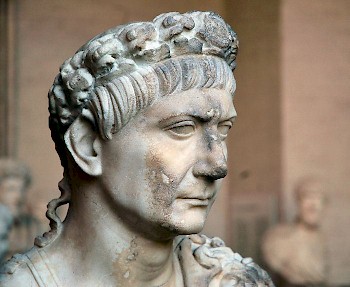
Again, we meet senators facing tyrants, like Germanicus, who successfully campaigned in Germania but was recalled by an envious Tiberius - a mirror image of Agricola's recall by Domitian - and perhaps veiled criticism of Hadrian, who had abandoned the eastern provinces conquered by Trajan. It seems that Tacitus died shortly after the publication of this masterpiece, perhaps in 120.
The Efficient Eulogist
Rome's memory was seated in its Senate. For centuries, its patrician members had passed on the rituals necessary to obtain favorable auspices, others had written books of history, and the old families proudly remembered the achievements of their ancestors, which had shaped the fortunes of the republic. At the funeral of a senator, the busts of his father and other relatives were carried along, and there was a speech in which the career of the deceased was commemorated to show that this man had been worthy of his ancestors.
Tacitus had not been able to attend Agricola's funeral, because he and his wife had been away from Rome. The treatise he published was some sort of substitute. It resembles a funeral speech very much, especially at the end, where Tacitus addresses his father-in-law as if he were present, lying on the pyre.note But the Agricola is more than a belated funeral speech. As we have already seen, the author seized the opportunity to stress that many magistrates had found it difficult to perform their duties during Domitian's reign. Even after Agricola had laid down the command of his army and posed no treat to the emperor, he had been forced to live in obscurity:
Agricola transferred a peaceful and safe Britain to his successor. Because he did not want to enter Rome too conspicuously [...] he entered the city during the night, and it was also during the night the night that he, according to orders, went to the palace, where he was received with a hurried kiss and without a word being spoken [...]. Anxious not to mitigate his military fame, something annoying to citizens, with other merits, he carefully embraced leisure and do-nothing. He dressed himself simply, was courteous in conversation, and never showed himself with one or two companion.note
In this one section, Tacitus achieves several aims: while praising Agricola's prudent modesty, he attacks Domitian's envy, and we can be sure that his fellow senators remembered that things had not been easy for the author himself. It is a testimony to Tacitus' rhetorical skills that he has succeeded on all accounts. Agricola receives comparatively much attention in modern histories of Roman Britain; Domitian is often regarded as a despot; and historians - including the present author - take Tacitus' description of his uneasy position during the reign of Domitian seriously. Well-written as it is, later generations considered Tacitus' Agricola worthy of being copied, which ensured its survival and influence.
Another aspect of the Agricola that reminds one of a funeral speech, is the element of exaggeration. Whatever Tacitus suggests, Britain had not been fully conquered, and when Domitian awarded Agricola triumphal decorations and a laureled statue, he gave him what he had deserved - nothing more, nothing less. When Tacitus implies that his father-in-law ought to have received a triumphal entry into the city,note he measures Domitian to a republican, senatorial standard: the historian must have been well-aware that for decades, this distinction had not been given to someone outside the imperial family. Remarks like these are fine in a eulogy, but not historiography.
The Other: the Germania
To give some color to Roman military victories, it was necessary to describe its opponents as dangerous barbarians, and Tacitus employs the stock examples from ancient ethnography. For example, in his Germania, he writes that the tribesmen live in an inaccessible country with an unpleasant climate, have large limbs and red hair, and have a potentially dangerous infantry but fight - free as they are - disunitedly.
Summing up: they have not yet been weakened by long peace: a sentiment that was common and is best known from the first line of Caesar's Gallic War, where it is said that the Belgians are the bravest of all Gauls because they live far away and are not exposed to the weakening effects of civilization; Tacitus also uses this explanation to describe the courage of the British tribal warriors. In fact, the customs of all nations on the edge of the earth are, according to Greek and Roman ethnographers, exchangeable. As sources for anthropological knowledge, the Agricola and Germania must be read with great caution. The same can be said for other ethnographic remarks - the description of the Jews in the Histories (text) is a notorious source of modern anti-Semitism.
Ethnographic stereotyping is also employed when the Roman armies are described. The army of the Rhine acts as if the soldiers are Germans; the legionaries from Syria are presented as effeminate Asians. It is fascinating to read, but no history.
Annalistic History
Tacitus' qualities have a lot to do with his acquired senatorial rank. For three centuries, senators had been writing a very specific type of history, called Annals. In these chronicles, the authors summed up the events in one particular year, starting with the names of the magistrates, continuing with foreign affairs, domestic politics, and finishing with other information and notable portents. This division was based on the notes that Rome's high priest kept to show which omens were related to which events.
This method, which creates maximum chronological clarity, also creates problems, because the story of -for example- a protracted war is interrupted by other events. One has to have a good memory to remember what has already been said about the topography of a given theater of war. In spite of this problem, Tacitus accepted this model in all his works - most clearly in the Histories and Annals, but also in parts of the Agricola. Without access to a map, an object few Romans owned, it is hard to understand Roman military strategy. Still, his information about the campaigns themselves appears to be comparatively accurate.
This brings us to the vexed question: what sources were used by Tacitus? We know that he wrote letters to people who could tell him more -two letters from Pliny the Younger, concerning the eruption of the Vesuvius, survive- but he must have used other sources of information as well. He pretty accurately renders a speech by Claudius, which has survived as an inscription. The idea that he checked the state's archives, has by now been rejected; and he sometimes quotes authors like Pliny the Elder. Still, it is remarkable that he was capable of ignoring important sources as well - his account of the Jewish War is not based on Flavius Josephus. Essentially, Tacitus' sources are an unsolved riddle - which is less surprising than it seems: he was not a real historian, but a moralist.
An Anti-Imperialistic Author?
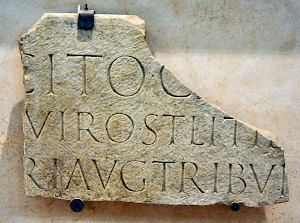
It was customary to insert speeches, in which the author could show that he was a capable orator. This also enabled a historian to make comments: the dry account of a campaign starts to make sense only when, in a speech, is explained why it is conducted, or what is at stake in a particular battle. Before he describes the battle at Mons Graupius, in which Agricola overcame the last resistance of the Caledonians, Tacitus inserts two speeches. The first one, by a British nobleman named Calgacus, contains a series of reproaches: the Romans are the "robbers of the world", who have "exhausted the land by universal looting", who "give robbery, slaughter and plunder the name empire" and "create a desert and call it peace".
This has been taken as evidence for an anti-imperialistic attitude. And it is true: ancient authors frequently said what they really thought about an actor through the mouth of his opponents. (A well-known example is the Gospel of Mark, in which the disciples are unsure who Jesus is, but the demons and Romans correctly address him as the Son of God.) But is unlikely that Tacitus really doubted Rome's mission to conquer the world. The charges voiced by Calgacus are stereotypical, and have direct parallels in the Histories of Sallust (86-34 BCE). Tacitus' own ideas can be deduced from the fact that he does not bother to explain why the British war was waged at all - expansion was normal and it was peace that called for an explanation. In Agricola's counter-speech at Mons Graupius, he does not even refute Calgacus' charges.note